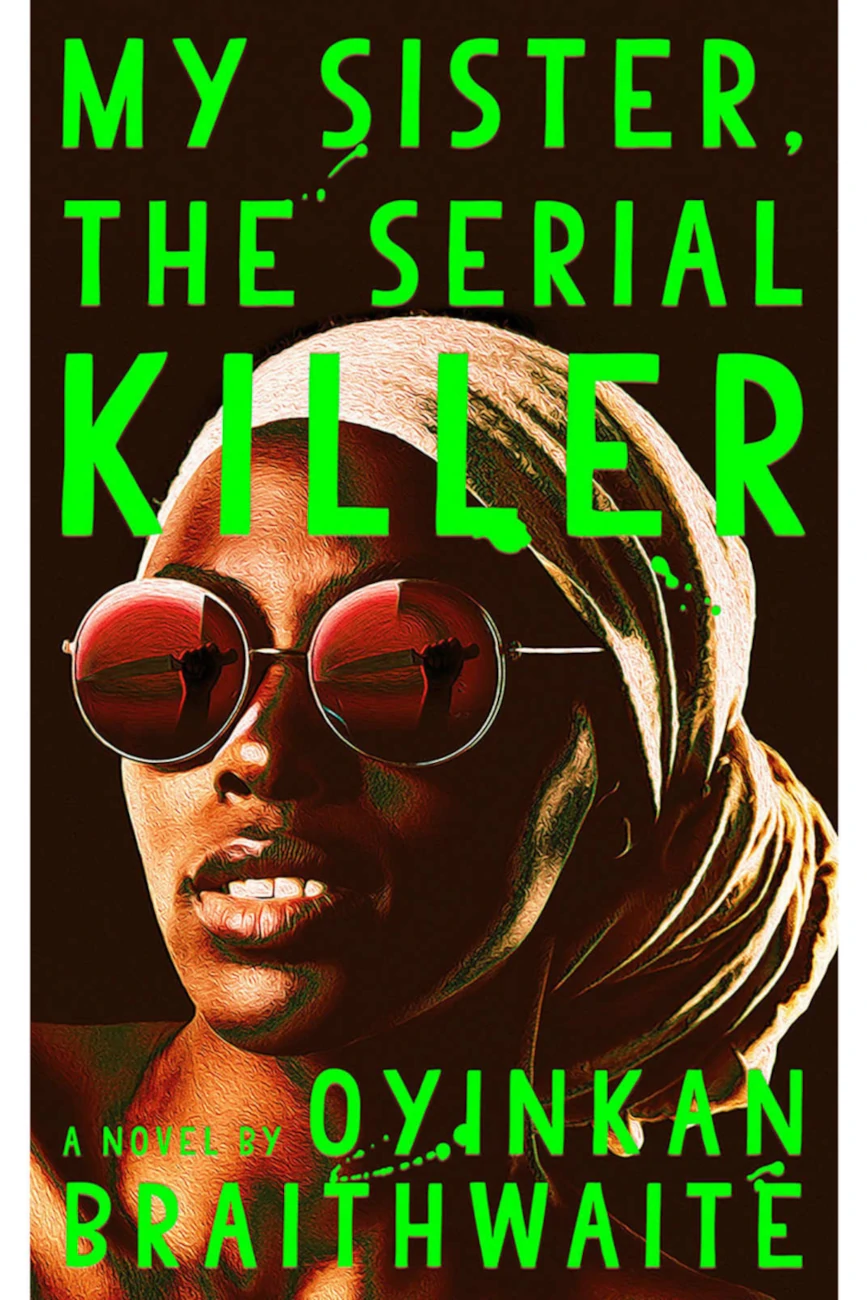
Oyinkan Braithwaite’s My Sister, the Serial Killer
Words By Kimberly Lee
“I bet you didn’t know that bleach masks the smell of blood.” So begins Oyinkan Braithwaite’s debut novel My Sister, the Serial Killer (Doubleday). I actually didn’t know that little tidbit about bleach and blood before picking up the book—so I guess it could dubiously be called “one to grow on.” I was initially drawn in by the title, which seemed to belie a droll, tongue-in-cheek perspective while simultaneously capturing the gravity of the situation. The book’s cover, featuring a portrait of a glamorous young woman wearing oversized sunglasses with reflections of daggers in the lenses, assured me that I was in for a wild ride. This assessment was spot on. The myriad of complications the situation necessarily creates makes My Sister, the Serial Killer a page-turner that doesn’t disappoint.
Poet Louise Glück said, “Of two sisters, one is always the watcher, one the dancer.” Glück’s philosophy is definitely borne out here in sisters Korede and Ayoola. Korede, the elder, has been categorically deemed less attractive and charismatic than her younger sister Ayoola by both family and society. Korede is tireless and hardworking; yet as she dutifully supports Ayoola, she secretly harbors resentment. Ayoola attracts suitor after eligible suitor, compliment after gushing compliment from all corners while Korede is expected to simply nod, smile, and even make sacrifices for her younger, more carefree sister. When Ayoola embarks on a mission to seduce the object of Korede’s long-unspoken affection, the physician Tade, just as Korede is about to express her interest, Korede is forced to face the conundrum of the unspoken yet ongoing competition with Ayoola—for attention, recognition, her rightful due.
The premise initially reminded me of the 2008 film “27 Dresses” starring Katherine Heigl and Malin Akerman, but the similarities ended there as the book plunged headfirst into the midst of a murder scene, complete with a trail of bloody bodies and poisoned, bloated corpses left in Ayoola’s wake. Ever-compliant, Korede is obliged to help scrub and scour the crime scenes, essentially becoming “the cleaner,” not unlike an oft-played Harvey Keitel character.
Despite the obvious strain between the two siblings, they are united by a common childhood experience of trauma at the hands of an abusive, totalitarian father who was flagrantly unfaithful to their mother. Though he has been dead for some time, his memory haunts the women and his presence remains palpable in the family home. Painful flashbacks of childhood incidents are skillfully interspersed with present-day events. These scenes illustrate how the sisters have protected each other for years, demonstrating the strength of their relationship as well as their common need to shield their mother from further harm and humiliation. As keepers of the long-held secret of their father’s abuse, a deep sense of trust and loyalty holds the sisters close. In one chapter, they and their mother are forced to come together to celebrate the late father’s birthday at an elaborate event with extended family. They whisper facetious comments to each other at every turn while they publicly pretend to miss this monster of a man.
My Sister, the Serial Killer is uniquely set in Lagos, Nigeria, and Braithwaite seamlessly and artfully infuses the novel with aspects of the region’s traditions and the native patois, rooting the family’s affairs deeply in cultural context. Braithwaite employs an ample cast of colorful characters, including snarky hospital workers, pushy relatives, village dignitaries, corrupt cops, and of course, Ayoola’s many suitors, including a budding poet. One particularly intriguing character is a comatose patient, Muhtar, whom Korede visits daily and cathartically confesses her situation to, believing he can’t hear her and expecting him to die. When it appears that Muhtar may actually make a full recovery, Korede is thrown into a frenzy wondering if he registered her words, and if so, what he will do with the information. Should she take preventive action? To further complicate things, it appears that Ayoola may ultimately win Tade over, and she fears for his safety, causing her to face a tricky dilemma—warning the man she loves or maintaining loyalty to her sister.
Braithwaite chooses to resolve some questions while leaving others unanswered, making this work a wonderful setup for a sequel that could further explore the sisters’ relationship and their individual growth. I finished the book with a morbid curiosity about what gripping situations these women would find themselves involved in next, proving that Braithwaite knows how to engage her audience. Readers who appreciate suspense will enjoy this captivating novel, a promising debut by an imaginative new author.